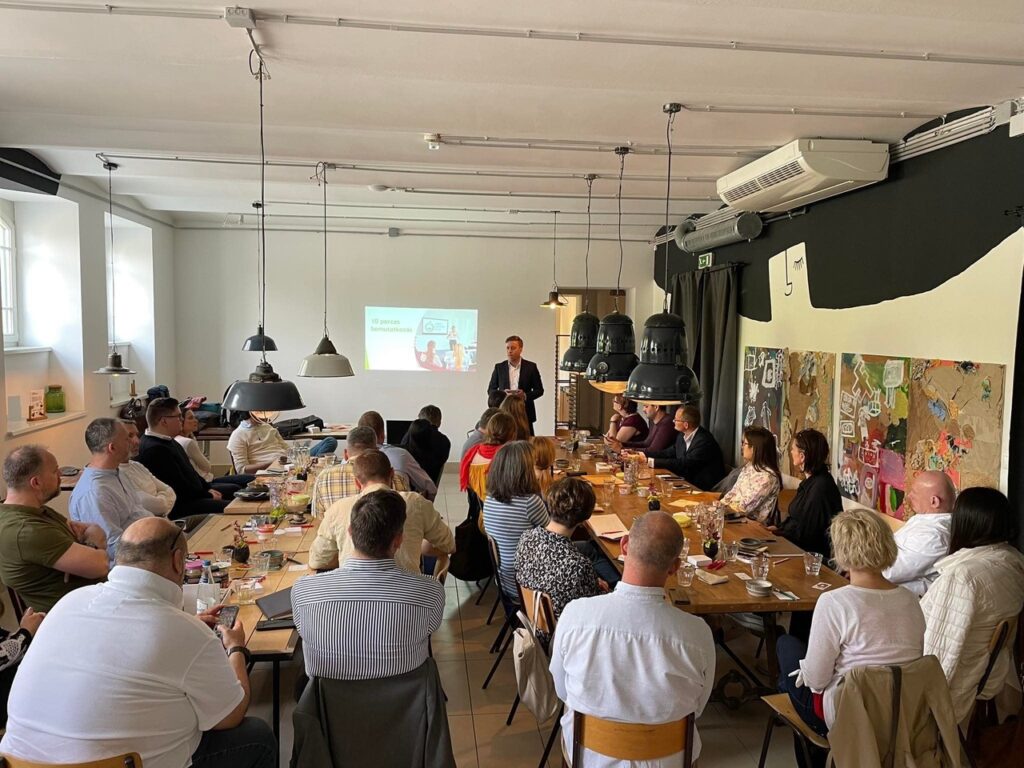From vegconomist.com
The Vegan Business Circle (VBC) is a global network that supports vegan and plant-based businesses by offering resources, networking opportunities, and educational programs. It connects entrepreneurs across industries like food, fashion, beauty, and wellness, aiming to promote plant-based living and sustainability.
Founded by Csaba Péntek, a committed vegan and author of The Price of Your Hamburger, VBC has become a thriving community for business leaders to collaborate and grow.
In this interview, Csaba discusses the inspiration behind VBC’s creation, the challenges and successes of expanding internationally, how the network stays locally relevant while maintaining a global mission, his experience with ProVeg’s Kickstarting for Good program, and the role of localized business networks in accelerating the plant-based economy.

Csaba Péntek © Vegan Business Circle
You launched the first Vegan Business Circle (VBC) in Hungary. What inspired you to create a dedicated networking platform for plant-based entrepreneurs, and how has the community evolved since then?
I have been an entrepreneur since I was 20 years old and have been part of several business communities over the years. Even though I have always been a strong introvert, I loved going to these communities because it felt good to be able to connect with people who are like-minded and share the same values. I gained a lot of useful ideas, knowledge, valuable contacts and friendships from these business communities.
So when I became vegan in 2019, the first thing I did was to look for a plant-based entrepreneurial community. However, I couldn’t find one, so I decided to start one myself. In the period of COVID, I had enough time refining my idea, and after that, in January 2022, I started organizing Vegan Business Circle business breakfasts with some of my vegan activist colleagues.
Since 2022, we have held more than 57 networking Business Breakfasts and 36 MasterMind meetups in Budapest. More than 1,000 entrepreneurs, business people and executives from government and non-profit organisations attended the business breakfasts and more than 800 new business contacts were made. Our members have been able to increase their annual income by more than 50% through new business contacts acquired directly and indirectly at VBC business breakfasts.
VBC was nominated for the Bridge Budapest Award in 2023, 2024 and 2025 in the category “Best Business Communities for Sustainability.” In Hungary, the VBC has been the basis for several other initiatives over the past 3 years. These include the Hungarian Association of Plant-Based Food Producers and Distributors, the Vegan Branding Masterclass, and the annual Hungarian Plant-Based Conferences.
VBC recently opened its first international chapter in Paris and London after several months of recruitment and planning. What were the key learnings from this expansion, and how has the reception been in the French and the UK plant-based business community so far?
In February this year, we announced that we were looking for chapter leaders in several European capitals to organize local VBC groups. Although we received more than 100 applications from 35 countries, we realized that during the selection process, we had to consider many more factors than we initially thought. The ideal chapter leader is both a team player and a leader, must be familiar with local conditions, but must also be able to bridge the language and cultural barriers between us. Fortunately, we found excellent chapter leaders with whom veganism provides a common ground that greatly facilitates our cooperation.
In recent months, we have also realized that it is better if a group is not led by a single person, but rather if responsibility is shared among several leaders who can support each other’s work, as our leaders in Paris do.
It was also a challenge to create a system that would ensure uniformity in all countries while complying with the different legal and tax environments, which is why a huge amount of technical development was required to get us ready for our international launch – which, of course, took a lot of time.

You’re now planning to launch VBC groups in more countries until 2025. What criteria do you use to select cities, and how do you ensure each chapter remains locally relevant while staying aligned with the broader mission?
This year, our goal is to test our original model that has already proven successful in Budapest. For this, we provide training, know-how, a brand guide, an international website, a CRM system, and materials for the chapter leaders. After each event, we will ask for feedback from both participants and chapter leaders to monitor how well the Hungarian model works in the given country. If we see that local members need different types of events, we will adapt to their needs. Our goal is not to impose our model on locals, but to build a system that can help members grow as effectively as possible in every country.
VBC was developed through ProVeg’s Kickstarting for Good program. How did this accelerator shape your journey, and what advice would you give to other social entrepreneurs in the vegan space?
I participated in the second cohort of Proveg’s K4G Program in 2024 with the idea of VBC International. During the program, mentors provided detailed training on how to build a high-impact non-profit organization. During the program, the mentors critically examined every project in detail and only allowed the most viable ones to move forward. This program had a huge impact on VBC.
I arrived with a plan to expand it to the V4 countries, and now we are building a global organization. I recommend this incubator program for every social entrepreneur who would like to establish a deep impact vegan initiative. I am especially grateful that at the end of the program, Sebastian Joy, the head of the K4G program and Proveg, joined the launch of VBC International as a co-founder and strategic advisor.
In your view, how can strong, localized business networks like VBC help accelerate the growth of the plant-based economy in both Western and Eastern Europe?
With the help of the VBC, numerous new business relationships and opportunities are being created in the plant-based business sector. Members of the business community (even through borders) can share their contacts, knowledge and experience with each other, enabling them to develop more quickly and become stronger.
In addition to the help of the VBC, additional initiatives such as advocacy associations, common campaigns, training courses, and conferences can be more easily established in every country, as has happened in Hungary. What’s more, all of this has a significant indirect impact on animal welfare and sustainability. More successful and efficient vegan businesses result in better quality vegan products, which will become available in more and more places, making it easier for consumers to choose them. Then animal use will decrease and sustainability will increase.
No comments:
Post a Comment